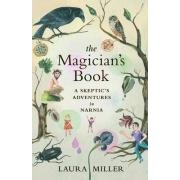
Jordan Davis recently wrote a review of Laura Miller’s Magician’s Book in the May 25th edition of The Nation.
The review, titled “Into the Wardrobe: C.S. Lewis’s Narnia,” has just been posted on line. In it, Davis makes observations about C.S. Lewis, his writings, and Laura Miller’s book, most of them aimed at exploring Miller’s central question about how readers form strong, and even lifelong, connections to Lewis’ stories, especially Narnia.
Here are a two excerpts:
Born in 1898 to a Belfast solicitor and his mathematics-trained wife, C.S. Lewis, or Jack, as he preferred to be called, was deemed by his tutor for the Oxford entrance exams to have been “born with the literary temperament,” and “while admirably adapted for excellence and probably for distinction in literary matters, he is adapted for nothing else.” It was true. An admirer of Beatrix Potter, young Jack wrote talking-animal novels and came to have hopes of success as a poet. One thing got in the way: he was not a poet. And not, by the way, in the manner in which Ford Madox Ford wasn’t a poet–Ford in his poems lived up to his standard that poetry should be at least as well written as prose. Lewis talked down to himself in his poems; this is the fatal flaw in much of what we know as bad poetry…
…In his criticism and the Narnia books, Lewis puts a premium on lush physical description, going beyond sight and sound to emphasize smell, taste and touch whenever possible. And he has the knack for what Soviet critic Viktor Shklovsky called ostranenie, or “enstrangement”–presenting familiar objects, scenes, feelings or even religious beliefs in an unfamiliar light so that the reader can experience them as if for the first time. These are indispensable qualities of Lewis’s best work, but they do not in themselves explain the fervor with which young readers form lifelong attachments to his stories.
For the full article, please visit The Nation by clicking here.
I wonder if I was the only one bothered by this statement in the Nation author’s review:
“Lewis referred to [Mrs. Moore], when he did at all, as his foster mother, but there is little doubt among his biographers that their relationship was, early on at least, more romantic than filial.” He then suggests that Lewis sent Maureen Moore to church every Sunday so that he and Mrs. Moore could be alone, ostensibly for romantic reasons.
Correct me if I’m wrong, but I understand that the question of the nature of Lewis’ and Mrs. Moore’s early relationship is still very much unanswered. Maybe the biographers Jordan Davis has read believe it was romantic, but a clear consensus in no way exists.
Not that it’s any of our business, anyway.